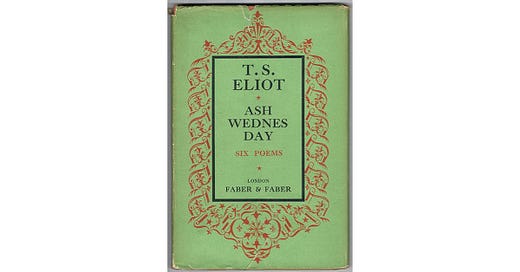Once a year - and only once a year - I feel pulled, as if by a magnet, back to church.
My secular alibi is that I feel a sudden aesthetic desire to look up at high ceilings and listen to live choral music while sniffing incense. The truth is more existential. I go becuase I feel moved, often on the verge of tears, to feel what I so skillfully deny every other day of the year - my mortality.
That’s what Ash Wednesday is for. On this day I seek, like a hungry infant seeks milk, for someone - it could be anyone - to smudge ash onto my forehead and remind me that I am going to die.
For dust you are and to dust you shall return.
I don’t need secular alibis anymore. I’m 46 and I figure I have to be at ease in my skin now. I would like the reader to know a sketch of the whole truth.
When I sit in church I often feel uneasy and pretentious. I want to feel at home but I am in exile from some other dimly imagined place I would prefer to be - a place where I am not pretending. In truth, I rarely hear biblical extracts that touch me - there is so much history and ponderous narrative to wade through before any gems can be found, and sometimes there is nothing there. The lyrics of the hymns are always so worthy and ridiculous that I sing them with a feeling of defeated conformity. And I don’t have, nor am I sure that I want, anything resembling a personal relationship with Jesus. So in Christian circles, I often feel impostor syndrome.
Some years ago, I think it was 2001, I was living in Oxford when Rowan Williams gave a short lecture series on four core subjects: God, Jesus, Bible, Church. I attended them all, and remember feeling that in the putative game of me against Christianity, it was a 2-2 draw. I have no problems with the idea or even the experience of God, and these days I would say wholeheartedly that I believe in God (though quite what that means is a whole conversation). I also like churches. I like not just that they are beautiful but that they are public spaces set aside for Being in an increasingly privatized world fixated on Doing. But back then, Jesus was mostly just a guy with a beard who was, as Woody Allen once put it, “remarkably well adjusted for an only child”. And reading the Bible felt mostly either strenuous, incongruous, or boring.
I feel a little differently now, a good few minutes into the second half of life. I’d say the score is more like 3-1 with a half-point each added from Jesus and the Bible. Reading Cynthia Bourgeault, especially The Wisdom Jesus, has helped me to reimagine Jesus as a historical figure teaching the transformation of consciousness, with parables that are mostly nondual insights disguised as stories. This notion doesn’t preclude the more contentious business of the miracles or the resurrection; it’s just that for the transgression of presumed material reality to make sense you need a cosmovision with intellectual integrity, and a credible metaphysics, and that’s what Cynthia Bourgeault - via Gurdjieff - provides in The Eye of the Heart. Moreover, Bourgeault has opened my eyes to the relatively untapped spiritual power of the gnostic gospels, which speak to me in a way that much of the New Testament doesn’t.
Then, to spice the sauce, there is the complexity of having already converted from the Christian faith I didn’t have to Hinduism, including an ostensive name change from Jonathan to Vivekananda, as detailed at the start of Tasting the Pickle.
All of which is to say that I am still trying to figure it out.
(And while I am on the subject, for anyone who is either ‘Christian-curious’ or appalled by the very idea that anyone today might take Christianity seriously, please read Unapologetic by Francis Spufford, a spellbinding book that starts with Christian emotions and works outwards from there.)
If I feel about 50% Christian on most days, on Ash Wednesday it goes up to about 90%, before going back to 50% the next day. The ritual awareness of death marked by the ash on the forehead is not about a sudden longing for an afterlife story. What matters is encountering the exquisite tenderness of existence through ritual, thereby affirming that life is beautifully impermanent. We are all evanescent stardust.
In addition to going to church on Ash Wednesday, I also like to read aloud the poem by TS Eliot named after this day. It’s an extraordinary work that has been widely analyzed, but I tend to let the words simply wash over me. This is the first time I’ve recorded myself reading it aloud.
The fairly long poem contains many memorable lines, but the one that speaks most to me is:
Teach us to care and not to care.
That seems to be our challenge: to know what to care about and to care for it well, while also knowing what is not worthy of our care, due to our quickening mortality.
Anyway, enjoy:






Such synchronicity. I’m currently engulfed in Cynthia Bourgeault’s books and teachings in the Wisdom Tradition, including the discovery of the pre-canonical gospels of Thomas and Mary Magdalene (Cynthia’s book on her is phenomenal!). A form of non-dual path seems quite possible within the broader confines of Christianity. A path that I had only considered passable through Easter wisdom traditions, including Advayta Vedanta. Your new name Vivekananda seems to point in that direction, I’m a big fan of Swami Sarvapriyananda’s teachings based on Swami Vivekananda.
Thank you for reading Eliot. That was wonderful